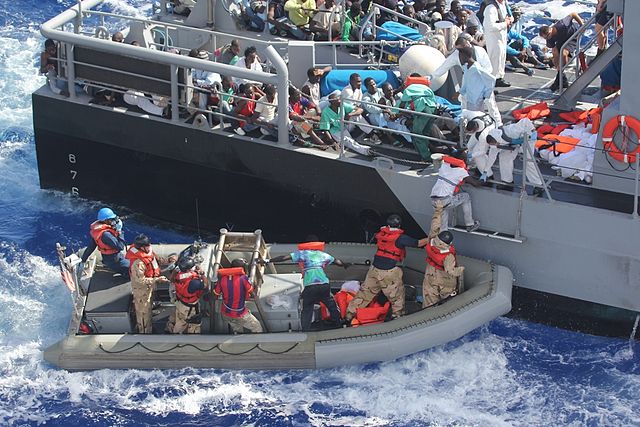World
IOM Urges Safety Reforms After 40 Migrants Die in Tunisia Shipwreck

The UN International Organization for Migration (IOM) has called for enhanced safety measures along migration routes following a tragic shipwreck off the coast of Tunisia that resulted in the deaths of 40 migrants. The incident occurred near Mahdia, where nine women, 19 men, and 12 infants and preschoolers lost their lives. In a response to this calamity, the IOM emphasized the need for improved coordination and protection-sensitive search and rescue operations to prevent further tragedies.
In a statement released on Thursday, the IOM expressed its condolences to the families of the victims and reiterated its commitment to supporting countries along vital migration paths. The organization highlighted the importance of expanding safe and regular migration channels, stating, “IOM reiterates its support for countries along key migration routes through protection-sensitive search and rescue operations.”
Survivors of the shipwreck were rescued by Tunisian naval forces, who managed to save another 30 migrants from West and Central Africa. This incident is part of a larger, alarming trend. According to the IOM’s Missing Migrants Project, nearly 1,000 deaths and disappearances have been recorded in the Central Mediterranean this year alone. Historically, the Mediterranean has been a perilous route for those fleeing conflict and violence in their home countries.
The IOM’s findings are particularly sobering when considering the historical context. In 2021, a similar shipwreck also resulted in the drowning of 40 migrants in Tunisia. The following year, a separate tragedy led to the sentencing of smugglers by the Tunisian Tribunal. Reports indicate that in 2024, a staggering 8,938 individuals have died on migration routes globally, highlighting a persistent humanitarian crisis.
Criticism of Tunisia’s migration policies has intensified, with Human Rights Watch condemning the country’s lack of an effective asylum system. Pope Leo XIV has also voiced concerns, describing the measures taken to curb illegal immigration as “ever more inhuman.” He reiterated that countries have a moral obligation to provide refuge for those in need.
Rights groups have raised alarms about the treatment of migrants, refugees, and asylum seekers by Tunisian security forces, which include reports of severe climatic conditions and forced expulsions towards the Libyan border. In a related issue, aid workers who have supported migrants are currently facing legal proceedings in Italy, where the government has enacted stricter laws on migration. Italy has formed agreements with Libya and other Mediterranean nations, claiming these measures protect its borders while enabling intercept operations at sea.
As the humanitarian situation deteriorates in regions such as Congo and Sudan, the tightening of migration policies in Europe raises concerns for rights advocates. They warn that increased enforcement measures will push migrants to riskier, unregulated routes, exacerbating already dangerous conditions. Many individuals facing these challenges endure significant risks, only to be met with stringent border controls that often lead to their return to countries like Libya and Tunisia, which implement Europe’s migration enforcement strategies in exchange for financial support.
The recent shipwreck and the growing number of fatalities along migration routes underscore the urgent need for concerted international efforts to address these humanitarian crises. The IOM’s call for enhanced safety and support for vulnerable migrants is a crucial step in recognizing and responding to the complexities of global migration today.
-

 Science1 week ago
Science1 week agoResearchers Challenge 200-Year-Old Physics Principle with Atomic Engines
-

 Politics1 week ago
Politics1 week agoNHP Foundation Secures Land for 158 Affordable Apartments in Denver
-

 Health1 week ago
Health1 week agoNeuroscientist Advocates for Flag Football Until Age 14
-

 Health1 week ago
Health1 week agoFDA Launches Fast-Track Review for Nine Innovative Therapies
-

 Lifestyle1 week ago
Lifestyle1 week agoLongtime Friends Face Heartbreak After Loss and Isolation
-

 Business1 week ago
Business1 week agoMaine Housing Inventory Surges to Post-Pandemic High
-

 World1 week ago
World1 week agoGlobal Military Spending: Air Forces Ranked by Budget and Capability
-

 Politics1 week ago
Politics1 week agoIsraeli Air Strikes in Lebanon Kill One, Wound Seven Amid Tensions
-

 World1 week ago
World1 week agoTroops to Enjoy Buffalo Chicken, Thai Curry in 2026 MREs
-

 Top Stories1 week ago
Top Stories1 week agoUnforgettable Moments: The Best Victoria’s Secret Performances
-

 Politics1 week ago
Politics1 week agoMassachusetts Lawmakers Resist Audit After Voter Mandate
-

 Business1 week ago
Business1 week agoSpirit Airlines Cuts Workforce with Furloughs for 365 Pilots









